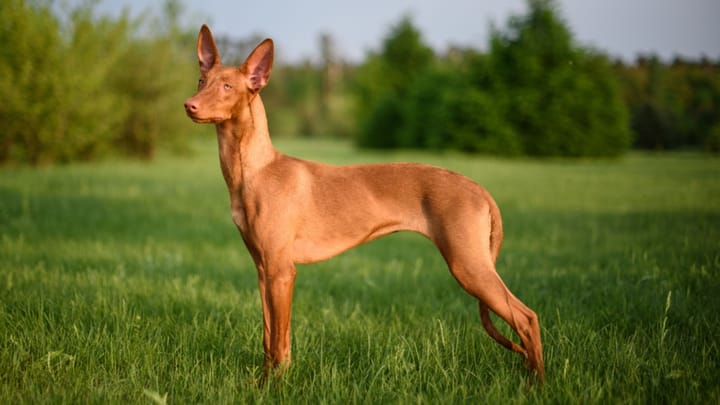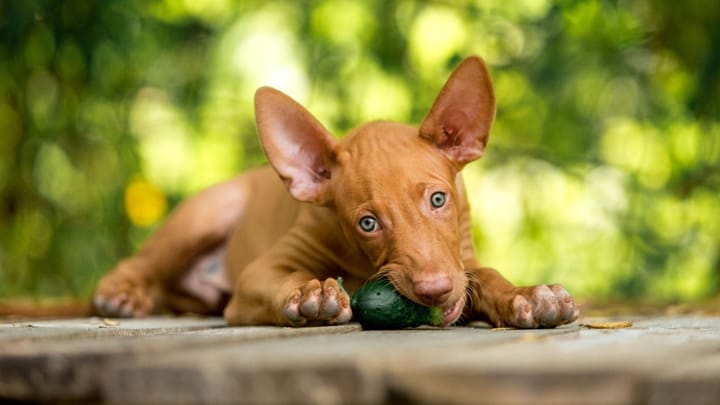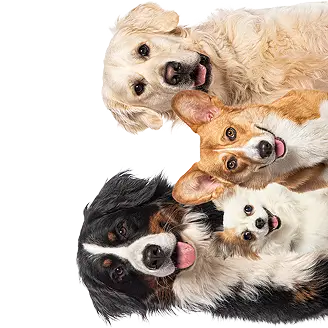Pharaoh Hound
Other names : Rabbit Dog, Kelb tal-Fenek


The native dog of Malta, the Pharaoh Hound is also known as the Rabbit dog. This is because it’s primarily used to track and hunt small game, including rabbits. It’s believed to have evolved from the ancient Tesem breed, which was an Egyptian hunting dog. The Pharaoh Hound does bear a striking resemblance to images and paintings found inside ancient egyptian tombs. It’s a friendly, active, and loyal dog. Although mainly used as a working dog, they can make great family pets.
|
Life expectancy |
The Pharaoh Hound has a life expectancy of between 11 and 13 years |
|
Temperament |
|
|
Size |
Medium
|
|
Adult size |
Female
Between 21 and 24 in
Male
Between 22 and 25 in
|
|
Adult weight |
Female
Between 44 and 55 lb
Male
Between 44 and 55 lb
|
|
Coat colour
Tan, with white markings on chest, tail, head, and toes accepted. |
Red Sand |
|
Type of coat
Short. Single coat. Fine. |
Short Hard |
|
Eye colour
Amber. |
Blue
Green
|
|
Purchase price |
The Pharaoh Hound costs between £900 and £1200 |
Pharaoh Hounds are very sensitive to the cold. Potential issues include frostbite and hypothermia. Invest in a top quality doggy coat and avoid walks during the coldest parts of the day.
Pharaoh Hounds haven’t been as domesticated as many other sighthounds, meaning they’re prone to more unusual behaviours such as coprophagia (poop-eating!)
More details about the Pharaoh Hound
Pharaoh Hound: Origins and history
The Pharaoh Hound was practically unknown in the UK and USA until the late 20th century. However, the dog's roots can be traced back to 4000 BC! An artefact found in ancient Egypt depicts two Pharaoh Hound-like dogs chasing a gazelle. It's believed that the breed was later imported to Malta by Phoenician traders. After showing the locals what it was capable of, it was quickly adopted as the national dog of Malta. This agile hunting dog soon earned the nickname "Kelb tal-Fenek”, which translates as the dog of the rabbit.
Physical characteristics of the Pharaoh Hound
Medium sized. Clean, clear lines. Lean, athletic frame, long neck. Large ears. Alert and inquisitive expression.
FCI classification of the Pharaoh Hound
-
Group 5 - Spitz and primitive types
-
Section 6 : Primitive type
Pharaoh Hound: Characteristics
Pharaoh Hound: Behaviour
Training a Pharaoh Hound
Responds really well to reward based training methods. Naturally intelligent and obedient. Thrives off positive reinforcement.
Pharaoh Hound: Lifestyle
Breed compatibility Pharaoh Hound
Pharaoh Hound: Purchase price
The initial cost of buying a Pharaoh Hound puppy will be between £900 to £1200. Budget between £40-60 each month to cover the cost of feeding your Pharaoh Hound. Other expenses, like insurance, will vary depending on your dog's age and medical history.
Pharaoh Hound: Grooming
A short haired dog with minimal grooming requirements.
Pharaoh Hound: Health
A healthy dog with no breed specific health issues and an average life expectancy of 11 to 13 years.
The Pharaoh looks quite delicate. However, this is a strong and robust dog built for the rough and tumble of rural life.
Being the national dog of Malta means that the Pharaoh Hound has no trouble dealing with the heat. Summer temperatures there often hit 30C.
These slim, short-haired dogs will struggle in the cold. Their long, thin ears are also prone to frostbite. Not built for colder climates.
Although they’re naturally lean, these greedy dogs will pile on the pounds if you don’t watch what they eat. They tend to get a little heavier as they approach old age.
- Eye disorders
- Luxating patella
- Hip dysplasia
- Sensitivity to barbiturate-based anaesthetics




